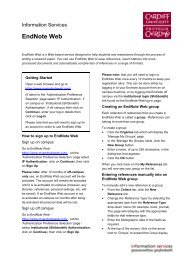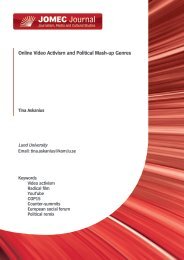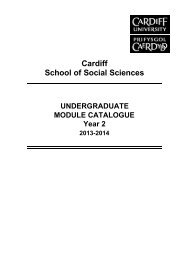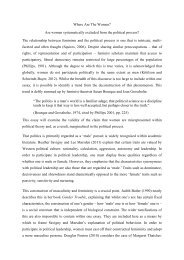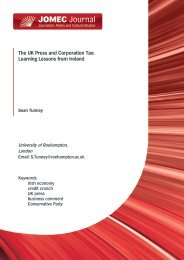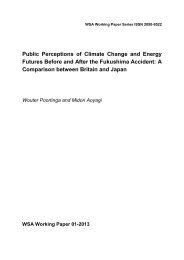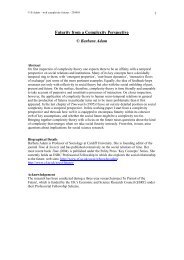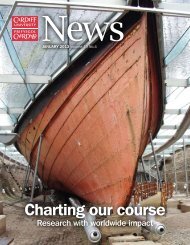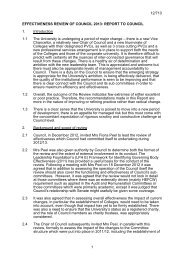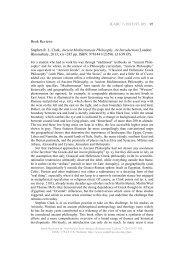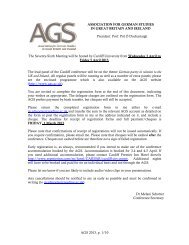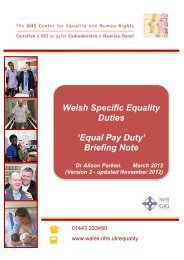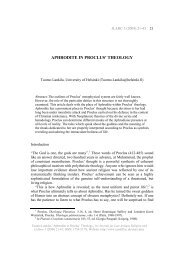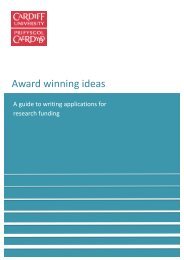Our 'Star' performer - Cardiff University
Our 'Star' performer - Cardiff University
Our 'Star' performer - Cardiff University
You also want an ePaper? Increase the reach of your titles
YUMPU automatically turns print PDFs into web optimized ePapers that Google loves.
News<br />
OCTOBER 2013 Volume 20 No. 1<br />
<strong>Our</strong> ‘Star’ <strong>performer</strong><br />
A new focus for Research,<br />
Innovation and Enterprise<br />
1
Introduction<br />
Introduction<br />
“<br />
As a research-intensive <strong>University</strong> which aims to be among the<br />
top 100 universities in the world, our commitment to research,<br />
innovation and enterprise is crucial.<br />
This edition of <strong>Cardiff</strong> News<br />
provides a brief insight into this<br />
work and our plans for this key area<br />
of <strong>University</strong> activity over the next<br />
few years.<br />
In this edition you’ll get a snapshot<br />
of how our research is already having<br />
a major impact. From improving<br />
labour relations in world ports to<br />
providing the evidence base for a<br />
roll-out of health checks for people<br />
with learning disabilities.<br />
Professor Jenny Kitzinger from<br />
our School of Journalism, Media<br />
and Cultural Studies sets out how<br />
her pioneering work into decision<br />
making for people in a vegetative<br />
state is raising greater awareness<br />
of this emotive issue and helping<br />
inform future practice.<br />
You’ll also learn how our growing<br />
reputation internationally is helping<br />
attract some of the world’s best<br />
minds to Wales - with the first<br />
appointment under the Welsh<br />
Government’s flagship Sêr Cymru<br />
programme and how our worldleading<br />
<strong>Cardiff</strong> expert in the genetics<br />
of Alzheimer’s has been brought into<br />
the heart of Welsh Government to<br />
direct science policy.<br />
The <strong>University</strong>’s Vice-Chancellor,<br />
Professor Colin Riordan also<br />
introduces the concept of the<br />
Innovation System and sets out what<br />
this means for our future direction.<br />
Investing in some key research<br />
areas we are already making a real<br />
difference and helping to tackle some<br />
of the world’s biggest challenges.<br />
However, we simply can’t afford to<br />
rest on our laurels, which is why as<br />
a <strong>University</strong> we are already looking<br />
to the future to ensure we lead the<br />
research agenda in Wales, the UK<br />
and internationally.<br />
Whether it’s positioning <strong>Cardiff</strong> for<br />
the next round of European Funding,<br />
setting up new research networks to<br />
discover new drugs or collaborating<br />
with partners like Bristol, Bath and<br />
Exeter to deliver more research<br />
income via the emerging GW4<br />
partnership – we are already leading<br />
the way.<br />
Finally, one of the major planks of<br />
our work is our international outlook.<br />
You’ll meet members of our<br />
European Office who are working<br />
alongside academics from across<br />
<strong>Cardiff</strong> <strong>University</strong> to make sure that<br />
we are positioned as the best and get<br />
a fair chance of accessing funding in<br />
the next round, as we look towards<br />
Horizon 2020.<br />
<strong>Cardiff</strong> <strong>University</strong> has set itself the<br />
next five years to ensure our research<br />
continues to have a global impact<br />
by tackling the grand challenges of<br />
our time.<br />
To do so, we need a set of actions:<br />
being highly selective in where<br />
we invest and where we choose<br />
to collaborate at a Wales, UK and<br />
international level; invest in major<br />
infrastructure projects; develop<br />
further our exciting plans for an<br />
Innovation System and build on our<br />
Research Institute’s specialisms.<br />
It’s an exciting agenda and I hope to<br />
keep you updated in future editions.<br />
Professor Hywel Thomas<br />
Pro Vice-Chancellor for Research,<br />
Innovation and Enterprise<br />
”<br />
“Investing in some key research areas<br />
we are already making a real difference<br />
and helping to tackle some of the world’s<br />
biggest challenges.”<br />
Professor Hywel Thomas<br />
2
cardiff INNOVATION SYSTEM<br />
<strong>Cardiff</strong> Innovation System<br />
“At <strong>Cardiff</strong> <strong>University</strong> we want to create<br />
an Innovation System that will drive<br />
economic growth in Wales.”<br />
The new concept of an Innovation System is set to form an<br />
essential part of the mechanism by which the <strong>University</strong> will deliver<br />
innovation and enterprise. Here, Vice-Chancellor Professor Colin<br />
Riordan outlines what the concept means in reality.<br />
Professor Colin Riordan<br />
“<br />
What are universities for?<br />
Everybody knows that universities<br />
exist to educate students and help to<br />
create a highly educated workforce.<br />
Most people know they’re also<br />
the place where research is done<br />
that ends up in technologies like<br />
smartphones, fuel-efficient cars and<br />
advanced medical care.<br />
That means universities are a critical<br />
part of the innovation process.<br />
Innovation is key to prosperity and<br />
improved well being, because it’s<br />
the invention and adoption of new<br />
products, processes, techniques and<br />
policies which, in mature economies,<br />
drive growth and future prosperity.<br />
The journey from idea to product is<br />
not straightforward though. The right<br />
conditions are needed.<br />
Silicon Valley was a success<br />
because universities - especially<br />
Stanford <strong>University</strong> - and the<br />
computer industry were co-located<br />
in California and, supported by<br />
government contracts, were a wellspring<br />
of innovation that drove the<br />
information revolution.<br />
At <strong>Cardiff</strong> <strong>University</strong> we want to<br />
create an innovation system that will<br />
drive economic growth in Wales. I<br />
don’t mean that we want to try to<br />
imitate what happened in Northern<br />
California from the 1940s on. But<br />
we can create a next-generation<br />
innovation system that will help<br />
put Wales at the forefront of new<br />
developments in technology,<br />
services, health, social policy,<br />
heritage, the arts and other areas.<br />
To do this we need to create<br />
a culture of innovation. <strong>Our</strong><br />
scientists working in key, closeto-market<br />
areas like catalysis,<br />
medical instruments, energy,<br />
aircraft materials and the like, need<br />
facilities where they can work<br />
closely with their counterparts in<br />
the relevant industries to take lab<br />
ideas to the stage where they can<br />
become commercial products.<br />
We need innovation hubs where<br />
start-up companies can get<br />
affordable space, advice and<br />
support so that their companies can<br />
grow and become independent.<br />
These companies might be<br />
university spin-outs, graduate<br />
entrepreneurs or local people with<br />
bright business ideas. We want<br />
students to be closely involved.<br />
We’ll create a centre for enterprise<br />
education fed from <strong>Cardiff</strong><br />
Business School. We want<br />
undergraduates to become used<br />
to innovation as a normal part<br />
of university life. We want to<br />
create a magnet that will attract<br />
businesses and allow them to grow<br />
and flourish. We want to add a<br />
social science element, so that we<br />
always know what’s happening in<br />
innovation policy round the world<br />
and understand how the public<br />
is going to view new products,<br />
services and technologies. We can<br />
help devise new policies that will<br />
work for Wales.<br />
This is not just about technology.<br />
Creative industries are a major<br />
growth area here and we’ll want a<br />
Creative Industries Hub to help drive<br />
innovation in that area too. We’ll<br />
need to work in partnership with the<br />
Welsh Government, local authorities<br />
and other universities so that the<br />
whole of Wales is working together.<br />
Make no mistake, <strong>Cardiff</strong> <strong>University</strong><br />
is innovating now. We always<br />
have. But we must be strategic and<br />
systematic, investing in our Maindy<br />
Road and Heath Park sites to ensure<br />
that we do everything possible to<br />
promote innovation, prosperity and<br />
improved wellbeing for the people of<br />
Wales into the future. ”<br />
Seminars are being planned for staff<br />
to engage further in the development<br />
of the <strong>Cardiff</strong> Innovation System<br />
during November and December.<br />
3
Research Excellence<br />
Shaping science policy<br />
<strong>Cardiff</strong> <strong>University</strong>’s Professor Julie Williams CBE has<br />
been appointed Wales’ new Chief Scientific Adviser.<br />
The Chief Scientific Adviser for<br />
Wales (CSAW) is responsible for<br />
providing independent and top<br />
quality scientific advice to the First<br />
Minister and his administration<br />
across a broad spectrum of topics to<br />
support decision and policy making.<br />
“I am honoured and delighted to have<br />
been offered this great opportunity<br />
to help shape, develop and champion<br />
the role that science plays in our<br />
society here in Wales and especially<br />
to follow in the footsteps of Professor<br />
John Harries who did so much work<br />
to support science and scientific<br />
research in Wales,” said Professor<br />
Williams, on taking up her new post.<br />
“The Welsh Government has already<br />
proved it takes science seriously and<br />
is prepared to construct strategies<br />
which take us in new directions and<br />
I want to play my part in helping that<br />
continue.<br />
causes of Alzheimer’s Disease with<br />
the excellent team we have in place.<br />
“I know a lot of hard work lies ahead<br />
but Wales and the Welsh Government<br />
have already proved we are prepared<br />
to lead the way,” she added.<br />
Professor Williams took over from<br />
Professor John Harries who retired<br />
earlier this year and was responsible<br />
for developing the Science for<br />
Wales strategy and introducing a<br />
number of initiatives to increase<br />
Wales’ science capabilities. Professor<br />
Williams will build on this, placing a<br />
particular emphasis on enhancing the<br />
provision of scientific advice in Welsh<br />
Government decision making across<br />
all its business areas.<br />
Vice-Chancellor, Professor Colin<br />
Riordan said: “Professor Julie<br />
Williams’s career as a scientist<br />
at <strong>Cardiff</strong> <strong>University</strong> has been<br />
“I know a lot of hard work lies ahead but Wales<br />
and the Welsh Government have already<br />
proved we are prepared to lead the way.”<br />
“Wales has some outstanding<br />
scientists working at the cutting-edge<br />
of research. Part of my role as Chief<br />
Scientific Adviser, will be to build<br />
on this strength and expand scientific<br />
excellence in Wales. The Sêr Cymru<br />
initiative provides a real opportunity<br />
to achieve this by supporting and<br />
attracting world-class scientists<br />
and by establishing new National<br />
Research Networks, in priority areas<br />
of science and engineering.<br />
“One aspect of my new role which<br />
is particularly close to my heart is<br />
the need to ensure every child in<br />
Wales knows the great opportunities<br />
which exist for them within the field<br />
of science and that science can be<br />
great fun.<br />
“I am also very grateful to <strong>Cardiff</strong><br />
<strong>University</strong> for allowing me to<br />
continue the research into the genetic<br />
remarkable, progressing as she has<br />
from Research Fellow to leading<br />
Professor in barely more than 15<br />
years.<br />
“Her discovery of genes that<br />
predispose people to contracting<br />
Alzheimer’s disease was an<br />
internationally significant step<br />
forward in our understanding of this<br />
devastating disease, and I am sure<br />
her appointment as Chief Scientific<br />
Adviser will be an inspiration to<br />
many.<br />
“The Welsh Government can be sure<br />
that it will be receiving the highest<br />
quality advice from a world-leading<br />
scientist who not only comes from<br />
Wales, but has made her career<br />
here. I am delighted for Julie, and<br />
on behalf of everyone at <strong>Cardiff</strong><br />
<strong>University</strong>, I wish her every success<br />
in this new role.”<br />
Professor Julie Williams<br />
4
Research Excellence<br />
‘Hidden’ health needs<br />
of adults with learning<br />
disabilities untapped<br />
More than 40,000 adults in England<br />
and Wales with learning disabilities<br />
are getting their health needs assessed<br />
and treated as a result of <strong>University</strong>led<br />
research.<br />
Research by Professor Michael<br />
Kerr and Professor David Felce<br />
from the <strong>University</strong>’s School of<br />
Medicine led to the roll-out of an<br />
annual programme of health checks<br />
designed to identify and treat what<br />
was previously ‘hidden’ illness.<br />
impact of repeated health checks.<br />
The latter is the most comprehensive<br />
study of repeated health checks to date<br />
and provides the evidence for health<br />
checks to be conducted annually.<br />
The research found that hidden<br />
health needs were identified for 51<br />
per cent of patients with 63 per cent<br />
having one health need, 25 per cent<br />
two needs and more than 12 per cent<br />
more than two needs.<br />
“Adults with a learning disability<br />
are a vulnerable group with high<br />
morbidity and substantial health<br />
disparities compared to the<br />
general population. Difficulties in<br />
understanding and communication<br />
mean that most cannot adequately<br />
recognise and report illness,”<br />
according to Professor Michael Kerr,<br />
who led the research.<br />
“Pro-active health checking was<br />
a potential method of uncovering<br />
hidden health needs and so we<br />
embarked on research which put it to<br />
the test,” he added.<br />
As a result, the <strong>Cardiff</strong> team devised<br />
the <strong>Cardiff</strong> Health Check format and<br />
embarked on two seminal studies.<br />
The first on the impact of conducting<br />
a health check and the second on the<br />
Amongst the most serious conditions<br />
uncovered included cancer, dementia,<br />
asthma and diabetes.<br />
Professor Kerr added: “Wales was the<br />
first country in the world to introduce<br />
comprehensive annual health<br />
checking for adults with learning<br />
disabilities as a result of our research<br />
and key campaigns by the Disability<br />
Rights Commission and Mencap.<br />
“This has been followed by Australia<br />
and England. In addition there has<br />
been considerable usage of the<br />
<strong>Cardiff</strong> Health Check format in New<br />
Zealand.<br />
“Overall there has been sustained,<br />
widespread behaviour change<br />
amongst GPs who have regular<br />
contact with people with learning<br />
disabilities.”<br />
<strong>Cardiff</strong> model dispels ‘myth’ of the ‘strike prone’ dockworker<br />
A new model which brings employers,<br />
trade unions and governments together<br />
to discuss proposed changes to<br />
working conditions has helped nail the<br />
myth that dockworkers are inherently<br />
‘strike prone’ and has helped avoid<br />
strikes and industrial action in the<br />
world’s ports.<br />
Professor Peter Turnbull from <strong>Cardiff</strong><br />
Business School has developed a<br />
unique model for the International<br />
Labour Organisation (ILO) based on<br />
social dialogue.<br />
The model brings together employers,<br />
trade unions and governments to<br />
discuss key issues for the industry<br />
including structural adjustment and<br />
private sector involvement.<br />
“Despite the widely held belief, in<br />
both academic and practitioner circles,<br />
that dock workers are inherently<br />
‘strike prone’ our research finds that<br />
this is simply not the case,” said<br />
Professor Turnbull, who led the<br />
research.<br />
Since the 1980s, port reform has been<br />
a key priority of governments around<br />
the world, with the privatisation of<br />
port services forming a significant<br />
part.<br />
Matched by changes in work methods<br />
and the introduction of advanced<br />
communication technologies, it was<br />
feared that these changes would be<br />
met with widespread strikes and other<br />
forms of industrial action, especially<br />
in Europe where plans were drawn up<br />
for an ‘open market’ for port services,<br />
including cargo handling.<br />
“Initially the plan was to deal with<br />
these issues, including the problems<br />
that typically accompany strikes such<br />
as delayed investment and job losses,<br />
through a binding Directive.<br />
“However, through our research<br />
we have been able to persuade the<br />
European Community that it could<br />
not legislate better labour relations<br />
in ports. Instead, by fostering social<br />
dialogue it could achieve the same<br />
end, and in a more lasting form,” he<br />
adds.<br />
As a result, Professor Turnbull was<br />
commissioned by the ILO to develop<br />
new guidelines for social dialogue<br />
in ports – which brings together<br />
governments, employers and workers<br />
to jointly shape policies and promote<br />
decent working conditions.<br />
5
News<br />
Leading catalysis research<br />
The <strong>Cardiff</strong> Catalysis Institute (CCI) is a<br />
Research Institute for catalysis within<br />
the UK that builds upon the current<br />
strengths in research at <strong>Cardiff</strong>. Its<br />
Director, Professor Graham Hutchings<br />
FRS – himself a research pioneer in gold<br />
catalysis – outlines the importance of<br />
its work.<br />
Professor Graham Hutchings<br />
“<br />
Catalysis is the centre-point<br />
of many chemical processes -<br />
from the academic research lab<br />
through living systems to the<br />
industrial large-scale reactor.<br />
Through a detailed<br />
understanding and careful use<br />
of catalysis many processes<br />
can be made faster, cleaner,<br />
more economical and more<br />
sustainable.<br />
<strong>Cardiff</strong> <strong>University</strong> has<br />
established the <strong>Cardiff</strong> Catalysis<br />
Institute (CCI) within the<br />
School of Chemistry.<br />
We have established a centre of<br />
excellence for catalysis within the<br />
UK that builds upon the current<br />
strengths in research. Chemistry<br />
at <strong>Cardiff</strong> already has excellence<br />
in heterogeneous catalysis,<br />
homogeneous catalysis and<br />
biocatalysis and we bring these<br />
together within a single institute<br />
so that they can grow and provide<br />
the focal point for interdisciplinary<br />
interactions within <strong>Cardiff</strong> and<br />
externally with academia and<br />
industry.<br />
The initial years of the CCI have<br />
gone extremely well, and staff, both<br />
established and new, are committed<br />
to the continuing development of<br />
a centre of excellence in catalysis<br />
at <strong>Cardiff</strong>, building on the large<br />
number of strengths existing in<br />
catalysis, synthesis, theory and<br />
surface science.<br />
So what does this mean for our<br />
ability to attract vital research<br />
funding?<br />
Earlier this year, I was delighted<br />
that we received a £3M funding<br />
boost as part of a major new hub<br />
designed to support economic<br />
growth, reduce CO2 emissions,<br />
produce cleaner water and generate<br />
more sustainable energy.<br />
The <strong>Cardiff</strong> team will receive<br />
£3.19M to lead the environmental<br />
element of the research – to help<br />
take waste products and turn them<br />
into useful materials.<br />
We will look at how to take<br />
‘waste’ materials such as carbon<br />
dioxide and use them to make<br />
useful materials, with specific<br />
focus on cleaning up atmospheric”<br />
pollutants, water purification for<br />
re-use, protecting the environment<br />
and cleaner manufacturing.”<br />
The UK Catalysis Hub, based at<br />
the Research Complex at Harwell<br />
(RCaH) in Oxfordshire, will enable<br />
scientists to collaborate on projects,<br />
share insights, expertise and<br />
developments; facilitate world-class<br />
research and attract new funding<br />
streams. Researchers will work at<br />
6
Research Excellence<br />
Professor Jenny Kitzinger’s research is focused on people’s<br />
experiences of having patients in a long-term coma and their<br />
thoughts on what the patient themselves might have wanted in<br />
this situation. Here, she outlines how her research focus was<br />
shaped by her own personal experience.<br />
“<br />
Modern medicine has become<br />
very good at saving the body. It<br />
is less good at saving or restoring<br />
the brain. Many of us will end our<br />
lives having long lost the mental<br />
capacity to make sense of the world<br />
around us and having become<br />
unable to make decisions for<br />
ourselves.<br />
different universities, and the<br />
RCaH will offer training and<br />
research.<br />
Catalysis science is vital for<br />
many areas of the UK economy.<br />
This investment will provide a<br />
focal point for the UK’s leading<br />
expertise in this area, helping<br />
scientists further develop their<br />
skills and undertake cutting edge<br />
research to drive sustainable<br />
growth.<br />
From a <strong>Cardiff</strong> point of view – it<br />
means we’re positioned firmly at<br />
the heart of this exciting area of<br />
research. ”<br />
When thinking about ‘loss of<br />
mental capacity’ many people’s<br />
first thought is ‘dementia’.<br />
However, my research focuses<br />
on people who are in a prolonged<br />
coma, a ‘vegetative’ state (with<br />
no awareness) or in a minimally<br />
conscious state (with only minimal<br />
and intermittent awareness).<br />
In these cases the loss of mental<br />
capacity is sudden (rather than<br />
a gradual decline). It may result<br />
from, for example, a severe blow to<br />
the head falling off a horse, ski-ing,<br />
or simply driving home from work.<br />
Such injuries often affect healthy<br />
young people – people who<br />
have rarely discussed explicitly<br />
what they would want in such a<br />
circumstance. Once they have lost<br />
capacity, decisions about treatment<br />
are the responsibility of their<br />
clinicians (with input from their<br />
families).<br />
How we treat such patients<br />
raises profound challenges that<br />
are paradigmatic of 21st century<br />
medicine.<br />
The reason I started doing this<br />
research is a combination of the<br />
professional and the personal.<br />
My research career, spanning the<br />
last 25 years, has focused on a<br />
wide range of health and science<br />
issues, often with an emphasis on<br />
examining emerging ethical and<br />
social debates. In the 1980s, for<br />
example, I worked around HIV/<br />
AIDS, and in the 1990s I examined<br />
controversies about human<br />
genetics.<br />
It was my own family experience<br />
however that made me turn my<br />
attention to severe brain injury. In<br />
2009 one of my sisters, Polly, was<br />
left in a prolonged coma after a car<br />
crash. This was a tragedy that took<br />
the whole family on a steep learning<br />
curve and confronted me with the<br />
fact that the media image of ‘coma’ is<br />
very far from reality.<br />
It also made me realize the need for<br />
not just communication research in<br />
this area but for a concerted interdisciplinary<br />
initiative.<br />
I went on to collaborate with<br />
practitioners in neurological care<br />
to research how long-term services<br />
could be improved and worked with<br />
a colleague at Brunel <strong>University</strong><br />
to explore the use of a novel brain<br />
scanning technology on vegetative<br />
patients. In 2011 I also organized a<br />
Wellcome Trust funded symposium<br />
with leading figures in the field to<br />
examine what future research was<br />
needed.<br />
My sister Celia Kitzinger, a Professor<br />
in the Sociology Department at<br />
the <strong>University</strong> of York, also had a<br />
long-standing career in health related<br />
research – and she too has turned her<br />
focus to this topic. Between us we<br />
have now interviewed more than 50<br />
family members with a relative in a<br />
vegetative or minimally conscious<br />
state.<br />
We have shared this data with<br />
a network of colleagues from<br />
across both universities (including<br />
specialists in law, philosophy,<br />
medicine, history and literature) and<br />
have established a new crossuniversity<br />
research centre.<br />
<strong>Our</strong> findings have already been<br />
used to inform guidelines for care<br />
homes and medical professionals<br />
and to create decision-support<br />
tools for clinicians and<br />
information leaflets for families.<br />
It has also informed cultural<br />
representations - not just media<br />
coverage but even a detective<br />
novel!<br />
I also served on the Nuffield<br />
Bioethics Council working party<br />
on novel interventions into the<br />
brain and am on the editorial<br />
board of a Royal College of<br />
Physician’s working party of<br />
the vegetative state (the new<br />
guidelines will be published in<br />
December). In the coming months<br />
Celia and I will be delivering<br />
on a collaboration with Oxford<br />
<strong>University</strong> to translate the<br />
research into web based support<br />
for families (Thanks to an ESRC<br />
knowledge exchange grant).<br />
Stretching my established ways of<br />
working even further we are now<br />
also developing collaborations<br />
with artists - there is already a set<br />
of sonnets based on our research!<br />
My portfolio of research about<br />
serious brain injury has been<br />
developed from the outset in<br />
dialogue with practitioners, policy<br />
makers and communities of<br />
service users.<br />
For me the ‘impact agenda’ is not<br />
a distortion or distraction from<br />
what I do, it is at its heart. ”<br />
7
Research Excellence<br />
Sustainable Places Research Institute<br />
The <strong>University</strong>’s Sustainable Places<br />
Research Institute is making new<br />
connections in sustainability research<br />
and progressing sustainability science.<br />
It is finding pragmatic, policy-led,<br />
local and place-based solutions for<br />
individual cities, regional landscapes<br />
and nations.<br />
Founded in 2010, the Institute<br />
operates across the three Colleges<br />
of <strong>Cardiff</strong> <strong>University</strong> developing<br />
interdisciplinary research to take<br />
a wholly place based approach.<br />
Bringing together more than 100<br />
researchers the Institute is moving<br />
towards developing solutions<br />
rather than simply tackling<br />
existing problems, this is being<br />
done on the specific requirements<br />
of individual places.<br />
Links have been built both here<br />
in the UK and further afield,<br />
research is progressing in a range<br />
of locations around the world<br />
including: Canada, China, Brazil,<br />
Borneo, Finland and Germany to<br />
name but a few.<br />
Professor Terry Marsden<br />
Key developments at<br />
the Institute include:<br />
• Theoretical and conceptual<br />
research linking different<br />
disciplines<br />
• Integrated methodologies<br />
for assessing impacts of<br />
policy, market and civic<br />
actions; and the development<br />
of more integrated and<br />
multidimensional approaches<br />
for assessing sustainable<br />
pathways of development<br />
• Development of a series of<br />
longitudinal place-based<br />
laboratories, like <strong>Cardiff</strong> City<br />
Region, in which to conduct<br />
multilayered applications of<br />
sustainability research<br />
• International and local<br />
collaborations and<br />
partnerships with academic<br />
institutions, including Bath,<br />
Bristol and Exeter Universities<br />
and place based organisations<br />
such as the Brecon Beacons<br />
National Park authority, and<br />
the Canal and Rivers Trust<br />
• The extension grant to<br />
take forward the ESRC<br />
funded Centre for Business<br />
Relationships, Accountability,<br />
Sustainability and Society,<br />
(BRASS) agenda in the areas<br />
of: mobilities, food security,<br />
sustainable communities and<br />
ecosystem services.<br />
Research highlights:<br />
• The Institute hosted a key<br />
conference highlighting Welsh<br />
expertise in ecosystem services.<br />
The interdisciplinary nature of the<br />
Institute team was vital in making<br />
the links between biodiversity,<br />
ecosystem services and social<br />
wellbeing. The conference,<br />
organised by the Biosciences,<br />
Environment and Agriculture<br />
Alliance (BEAA) between Bangor<br />
and Aberystwyth Universities<br />
and the Wales Environment<br />
Research Hub (WERH) explored<br />
the research strengths of the St<br />
David’s Day Group of Universities<br />
(Aberystwyth, Bangor, <strong>Cardiff</strong>,<br />
Glamorgan and Swansea),<br />
showcasing and highlighting<br />
opportunities for collaboration<br />
between the Universities and<br />
policy makers<br />
• The Institute held a series of<br />
workshops, forming the basis of<br />
a new ‘place’ based approach to<br />
academic research. Gathering<br />
knowledge and views on issues<br />
of concern to people in their local<br />
area will help to guide the future<br />
direction of research linked to that<br />
place<br />
• The first Landscape Observatory<br />
to foster socio-ecological research<br />
on whole river catchments is<br />
created. With 5 year support from<br />
The Esmee Fairburn Foundation,<br />
the Llyn Brianne Observatory in<br />
the Welsh uplands, will be the first<br />
to assemble more than 3 decades<br />
of social and ecological data on<br />
14 catchments to study the role of<br />
biodiversity and natural resources in<br />
sustaining livelihoods in upland areas<br />
• The Diversity of Upland Rivers for<br />
Ecosystem Service Sustainability<br />
project (DURESS) received £3<br />
million for new interdisciplinary<br />
river research to investigate the<br />
role of biodiversity in sustaining<br />
ecosystem services. The consortium<br />
project is headed by Dr Isabelle<br />
Durance, senior research fellow who<br />
spearheaded the proposal<br />
• The Sustainable Food City<br />
Conference brought together<br />
speakers from across the UK, to<br />
look at how <strong>Cardiff</strong> could implement<br />
a Food Charter to celebrate and<br />
promote a vibrant, diverse and<br />
sustainable food culture which will<br />
fit with <strong>Cardiff</strong>’s broader aim to<br />
become a ‘One Planet City’<br />
• The lesser known star of the marine<br />
environment, seagrass receives a<br />
boost following support from the<br />
Darwin Initiative. The award will<br />
fund a project, led by Professor<br />
Susan Baker and Dr Leanne<br />
Cullen-Unsworth that will focus<br />
on seagrasses and their role in<br />
sustaining marine environments<br />
• Professor Terry Marsden is<br />
appointed to the Policy and<br />
Advisory Panel of Rural Alliances,<br />
an exciting new £10M initiative for<br />
rural communities which promote<br />
best practice between different EU<br />
regions. Helping to further establish<br />
the role of the Institute in sustainable<br />
place making across Europe<br />
• The Institute hosts the first<br />
<strong>Cardiff</strong> International Conference<br />
on Sustainable Place making.<br />
It focused on the problem of<br />
sustainable place-making; and<br />
how integrated thinking can<br />
be developed and applied in<br />
different places and spaces so as<br />
to adapt systems of production<br />
and consumption<br />
• Institute researchers join the<br />
Food Security Land Research<br />
Alliance, a partnership between<br />
the Universities of Bath, Bristol,<br />
<strong>Cardiff</strong>, Exeter and Rothamsted<br />
Research. The alliance brings<br />
together a range of disciplines<br />
from biosciences and agricultural<br />
sciences to economics and social<br />
sciences, to help tackle the world<br />
food security crisis<br />
• The Institute launches a new<br />
annual Sustainability Science<br />
Summer School, a joint venture<br />
with the <strong>University</strong> Graduate<br />
College, to provide a unique and<br />
high quality research training<br />
forum for interdisciplinary<br />
doctoral and postdoctoral<br />
researchers in the field of<br />
sustainability science and<br />
place-making<br />
• Dr Roberta Sonnino (Principal<br />
Investigator), Dr Ana Moragues<br />
Faus and Professor Terry<br />
Marsden (co-applicants) are<br />
awarded a new EU grant on food<br />
security. The four year project<br />
will assess the impact of drivers<br />
of change on Europe’s food and<br />
nutrition security.<br />
8
A new approach to tackling cancer<br />
Research Excellence<br />
Some of the world’s leading cancer experts descended on<br />
South Wales to hear how a new cancer stem cell approach<br />
could better target cancer.<br />
Hosted by Sir Terry Matthews, the<br />
international three-day ‘Targeting<br />
Cancer Conference’ was held at the<br />
home of the 2010 Ryder Cup, The<br />
Celtic Manor Resort in Newport.<br />
The conference was dedicated to the<br />
theme of Cancer Stem Cells where<br />
the Director of the <strong>University</strong>’s<br />
European Cancer Stem Cell Research<br />
Institute (ECSRCI) Professor Alan<br />
Clarke, unveiled the Institute’s new<br />
approach to tackling cancer.<br />
Sharing the team’s latest findings,<br />
Professor Clarke outlined how the<br />
<strong>University</strong>’s cancer stem cell concept<br />
might be used to target cancer, and in<br />
the long-term improve the prognosis<br />
for patients and develop new cancer<br />
therapies.<br />
“The Research Institute will investigate<br />
the possibility that therapies aimed at<br />
cancer stem cells alone will offer a<br />
better success rate.”<br />
Professor Clarke said: “Cancer<br />
stem cells account for only a small<br />
proportion of cells in a tumour.<br />
However, they could be crucial to the<br />
way tumours form, grow and spread.<br />
“The Research Institute will<br />
investigate the possibility that<br />
therapies aimed at cancer stem cells<br />
alone will offer a better success rate<br />
for cancer sufferers and will, we hope,<br />
markedly improve survival rates.”<br />
Professor Alan Clarke<br />
‘Switch-flipping’ stem cell mechanism could<br />
lead to new breast cancer therapies<br />
The discovery of a pathway that helps stem cells grow into different<br />
types of breast tissue by experts from the <strong>University</strong>’s European<br />
Cancer Stem Cell Research Institute could lead the way to new<br />
treatments for aggressive breast cancer.<br />
in normal cells, changing the<br />
number parallel basal cells and<br />
perpendicular luminal cells that<br />
were produced.<br />
The pathway allows stem cells to<br />
flip their orientation of cell division,<br />
switching their offspring to form two<br />
distinct tissues found in the breast.<br />
Some aggressive breast cancers<br />
use this mechanism to control the<br />
orientation of cancer cell division,<br />
so it could be a promising target for<br />
future drug development.<br />
Dr Matt Smalley from the European<br />
Cancer Stem Cell Research Institute,<br />
said: “Current theories suggest that<br />
there may be similarities between the<br />
behaviour of normal adult stem cells<br />
and cancer cells.<br />
“By better understanding the biology<br />
of adult stem cells scientists can<br />
better understand the behaviour of<br />
cancer cells and identify new targets<br />
for therapy.”<br />
The mammary epithelium consists<br />
of two main types of cells: luminal<br />
epithelial cells, which line the ducts<br />
and form the milk-secreting cells of<br />
the alveoli, and basal myoepithelial<br />
cells, which squeeze milk along the<br />
ducts during lactation.<br />
Basal stem cells are important during<br />
early breast development because<br />
they generate the different cell<br />
types in the mammary epithelium,<br />
through the expression of an enzyme<br />
called Aurora A. In this study, the<br />
researchers investigated how the<br />
enzyme Aurora A controls the<br />
formation of new cells in the breast.<br />
Dr Smalley’s team identified for the<br />
first time a link between Aurora A<br />
and a signalling pathway known to<br />
regulate the behaviour of stem cells,<br />
called the NOTCH pathway. They<br />
found that Aurora A was able to<br />
control the direction of cell division<br />
in the breast by triggering the<br />
NOTCH signalling pathway.<br />
The researchers found that for basal<br />
stem cells to maintain populations of<br />
basal and luminal cells, cell divisions<br />
in the basal layer of the breast needed<br />
to be parallel, which occurred when<br />
NOTCH signalling was blocked.<br />
But they discovered that basal cells<br />
can also contribute to the luminal<br />
layer. Aurora A activated NOTCH<br />
signalling in the dividing basal cells,<br />
which caused their orientation to<br />
switch from parallel to perpendicular.<br />
The researchers were able to<br />
chemically control the signalling<br />
produced by the NOTCH pathway<br />
Dr Smalley believes that some<br />
aggressive breast cancers have<br />
re-activated this mechanism to<br />
control the orientation of cancer cell<br />
division, and that its discovery could<br />
lead to new treatments for breast<br />
cancer:<br />
“If we can block this mechanism<br />
in breast cancer tumours, this<br />
could cause cells to try to divide in<br />
multiple directions at the same time,<br />
resulting in catastrophic disruption<br />
of genetic material and cell death.<br />
“<strong>Our</strong> study suggests that drugs<br />
which can target this signalling<br />
mechanism could cause these cells<br />
to literally tear themselves apart,<br />
leading to better treatments for<br />
aggressive breast cancer in the<br />
future,” he added.<br />
9
Research Excellence<br />
Taking our research<br />
message to Europe<br />
Some of the <strong>University</strong>’s leading experts in neuroscience and<br />
brain-related research are heading to Brussels in a bid to position<br />
<strong>Cardiff</strong> as one of Europe’s leading institutions in the field and help<br />
build new national and international collaborations.<br />
Professor Jeremy Hall from the<br />
<strong>University</strong>’s Neuroscience and<br />
Mental Health Research Institute will<br />
host a seminar at Wales House in<br />
Brussels in November.<br />
“Brain and brain-related research<br />
is one of <strong>Cardiff</strong>’s key research<br />
strengths,” according to Professor<br />
Hall who will be joined by the<br />
<strong>University</strong>’s latest expert recruit,<br />
Professor Yves Barde.<br />
“In addition to UK and international<br />
funding, teams from <strong>Cardiff</strong><br />
have already successfully bid for<br />
and secured European funding<br />
including the JPND programme – a<br />
transnational initiative that aims<br />
to address the growing societal<br />
challenge presented by age-related<br />
neurodegenerative diseases,” he adds.<br />
He will be joined by the Institute’s<br />
Director, Professor Mike Owen<br />
and other key members of the team<br />
including Professor Adrian Harwood.<br />
Professor Hall adds: “The seminar is<br />
a clear opportunity to build potential<br />
collaborations going forward to<br />
Horizon 2020 and the next round of<br />
research funding.<br />
“More importantly we see events like<br />
this as an opportunity to kick-start a<br />
‘neurosciences’ sub–cluster as part of<br />
the overall health cluster as a means<br />
of maximising <strong>Cardiff</strong>’s role in future<br />
funding rounds.”<br />
The seminar will focus<br />
on the themes of:<br />
stem cells and animal<br />
models.<br />
Institute secures £5.2M to<br />
help solve the mystery of mental illness<br />
behaviour by harnessing recent<br />
advances in neurosciences and stem<br />
cell research,” he added.<br />
<strong>Cardiff</strong> has assembled a team of<br />
scientists with complementary<br />
expertise in psychiatry and<br />
neuroscience from across the Schools<br />
of Medicine, Biosciences and<br />
Psychology.<br />
Experts from across the <strong>University</strong>’s<br />
Neuroscience and Mental Health<br />
Research Institute have secured their<br />
largest ever funding in a bid to tackle<br />
mental illness.<br />
A team from the <strong>University</strong>’s<br />
Neuroscience and Mental Health<br />
Research Institute have secured a<br />
£5.2M Wellcome Trust Strategic<br />
Award to help combine the latest<br />
findings in genetics, brain imaging,<br />
animal models and stem cells<br />
<strong>University</strong> neuroscientists, stem<br />
cell biologists, psychologists and<br />
psychiatrists are set to break down<br />
scientific barriers in a bid to solve the<br />
mystery of mental illness and help<br />
develop new treatments.<br />
“Recent findings in genetics have<br />
advanced our understanding of<br />
mental illness and major psychiatric<br />
disorders in important new ways,”<br />
according to Professor Mike Owen,<br />
who leads the research.<br />
Professor Mike Owen<br />
“We now know that disorders like<br />
schizophrenia, attention deficit<br />
hyperactivity disorder share some of<br />
the same genetic risk factors.<br />
“They also point to an important role<br />
in these disorders for abnormalities<br />
in synapses – the structures through<br />
which brain cells communicate with<br />
each other.<br />
“The next step in understanding<br />
these disorders is to take the genetic<br />
findings and trace them into how<br />
the brain functions and influences<br />
By developing a novel approach<br />
- combining human, animal and<br />
cellular experiments for the first<br />
time - the <strong>Cardiff</strong> team hopes to gain<br />
new understanding on how specific<br />
genetic risk factors impact on the<br />
brain and behaviour.<br />
Dr John Williams, Head of<br />
Neuroscience and Mental Health at<br />
the Wellcome Trust, said: “Although<br />
mental health disorders affect as<br />
many as one in four people, we’ve<br />
made relatively little progress in our<br />
understanding of these diseases and<br />
how to treat them in several decades.<br />
“This project will help us to start to<br />
really get to grips with the genetic<br />
and biological problems underlying<br />
the conditions.”<br />
10
Research Excellence<br />
<strong>University</strong> lands ‘Star’ stem<br />
cell researcher<br />
A world-leading neurobiologist has joined the <strong>University</strong> as the<br />
first appointment under the Welsh Government’s £50M flagship<br />
science initiative.<br />
Professor Yves Barde, from<br />
Switzerland, is renowned for his<br />
research into the way proteins in the<br />
brain work and their role in illnesses<br />
such as depression.<br />
He was appointed under the Welsh<br />
Government’s five-year Sêr Cymru<br />
(Stars of Wales) project to expand<br />
universities’ research capabilities in<br />
the fields of life sciences, advanced<br />
engineering, and low carbon energy<br />
and the environment.<br />
Professor Barde received<br />
international acclaim in 1989 with<br />
the discovery of a gene which creates<br />
a protein - brain derived neurotrophic<br />
factor (BDNF) - which is involved<br />
in a number of brain processes<br />
including memory.<br />
He has explored the role BDNF plays<br />
in healthy brain function along with<br />
dysfunction.<br />
Recently his team at the <strong>University</strong><br />
of Basel focused on how some drugs<br />
can increase BDNF levels in specific<br />
areas of the brain.<br />
The research helped in the<br />
development of new drugs, including<br />
the first oral treatment of multiple<br />
sclerosis.<br />
Professor Ole Petersen FRS, Director<br />
of the School of Biosciences, said:<br />
“This is a very exciting moment<br />
in the history of the School of<br />
Biosciences. Not only have we been<br />
able to attract a world class superstar<br />
to come to the School of Biosciences<br />
but we also have the prospect of<br />
seeing some superior science being<br />
conducted here. The synergy with<br />
Professor Alun Davies FRS is<br />
particularly promising.<br />
“Professor Barde is responsible for<br />
many important discoveries and<br />
fundamental concepts in the field<br />
of neurobiology. In addition to his<br />
groundbreaking work on BDNF and<br />
neurotrophins, Yves has discovered<br />
many important developmental<br />
principles and molecular mechanisms<br />
in the nervous system that were<br />
iconoclastic and controversial<br />
when first proposed, but are now<br />
mainstream.<br />
“To this day, Yves continues to<br />
make major advances in the field of<br />
neuroscience, such as his recent work<br />
on stem cell biology in the nervous<br />
system.”<br />
Economy and Science Minister,<br />
Edwina Hart, said: “Professor Barde<br />
brings a wealth of experience and is<br />
a world renowned innovator in the<br />
field of neurobiology. He will lead<br />
a strong team at <strong>Cardiff</strong> <strong>University</strong><br />
and their work will be a great boost<br />
to life sciences and health research<br />
in Wales.<br />
“A strong science research capability<br />
is vital to improving our economic<br />
wellbeing and securing a prosperous,<br />
healthy and sustainable future for<br />
Wales.<br />
“We already have a lot to be proud<br />
of in science and innovation in Wales<br />
but the Sêr Cymru programme will<br />
help us build on that to develop a<br />
dynamic and strong base in Wales.”<br />
Professor Yves Barde<br />
11
NEWS<br />
<strong>Cardiff</strong> leads £14M Welsh<br />
drug discovery fund<br />
New drugs to fight a range of diseases could be discovered and developed in<br />
Wales with a £14M cash injection.<br />
The National Research Network<br />
(NRN) in Life Sciences and Health<br />
is part of wider plans to concentrate,<br />
connect and boost the Life Sciences<br />
sector in Wales.<br />
Led by <strong>Cardiff</strong> <strong>University</strong> Professors<br />
Chris McGuigan and Malcolm<br />
Mason the NRN also brings together<br />
expertise in drug development from<br />
Aberystwyth, Bangor and Swansea<br />
Universities.<br />
“The establishment of this major<br />
pan-Wales initiative, with significant<br />
funding from Welsh Government<br />
represents a serious commitment<br />
by the Minister to health and life<br />
sciences,” according to the Chair<br />
and Scientific Director of the NRN,<br />
Professor Chris McGuigan.<br />
“This commitment comes on top of<br />
the recent establishment by Welsh<br />
Government of the Welsh Life<br />
Sciences Fund, chaired by Sir Chris<br />
Evans, to support new and growing<br />
life science businesses in Wales, and<br />
also plans to open a Life Science<br />
Hub at <strong>Cardiff</strong> Bay by March 2014,<br />
which I am currently leading on,”<br />
he added.<br />
The NRN is backed by £7.3M from<br />
the Welsh Government’s Sêr Cymru<br />
programme , which will be matched<br />
by industry, academia and charities<br />
to create a fund worth £14M.<br />
This will allow the four Welsh<br />
universities to support more than<br />
100 PhD students and researchers<br />
over the next five years and attract<br />
and retain the world’s leading<br />
experts to oversee their pioneering<br />
work.<br />
Minister for Economy and Science,<br />
Edwina Hart, said: “I am delighted<br />
to see the launch of this new life<br />
sciences research network. We have<br />
identified life sciences as one of our<br />
Professor Chris McGuigan<br />
12
Smarter European Union spending<br />
NEWS<br />
<strong>Cardiff</strong> leads consortium to help countries spend<br />
EU funds more strategically<br />
key sectors for economic growth<br />
and I look forward to seeing the<br />
results of the Network’s activities<br />
in bringing to pre-clinical stage and<br />
clinical trial new and exciting drug<br />
compounds.<br />
“The Network will also engage<br />
with industry to bring economic<br />
benefits and put Wales on the map<br />
internationally for drug discovery.<br />
“I am sure the Network will also<br />
take advantage of the appointment<br />
of Professor Yves Barde as the<br />
<strong>Cardiff</strong> <strong>University</strong> Sêr Cymru<br />
Research Chair in Neurobiology,<br />
a research field in which our new<br />
Chief Scientific Advisor Professor<br />
Julie Williams also has a great<br />
interest.<br />
“I look forward to seeing the<br />
<strong>University</strong> and Professors<br />
McGuigan and Mason deliver their<br />
vision for the Network.”<br />
<strong>University</strong> experts who advise<br />
regional governments on making<br />
the most effective use of money<br />
aimed at reducing regional<br />
disparities in income, wealth and<br />
opportunities are set to lead a<br />
major new EU research project<br />
under the Seventh Framework<br />
Programme (FP7).<br />
Professor Kevin Morgan and<br />
Dr Adrian Healy from the<br />
<strong>University</strong>’s School of Planning<br />
and Geography will co-ordinate<br />
the SmartSpec consortium.<br />
The consortium has two<br />
major aims. To explore the<br />
scope for and the barriers to<br />
Smart Specialisation, the new<br />
generation of regional innovation<br />
policies in the EU and provide<br />
guidance and practical support<br />
to regional governments which<br />
plan to design and new regional<br />
innovation strategies.<br />
In the past year they have advised<br />
governments on the design of<br />
regional innovation policy in a<br />
number of countries – including<br />
Wales, England, Northern Ireland,<br />
Italy and Spain. <strong>Cardiff</strong> <strong>University</strong><br />
is gaining a reputation as a centre<br />
of expertise in emerging concepts<br />
of regional innovation.<br />
The EU Smart Specialisation<br />
Platform has been set-up by the<br />
European Commission to provide<br />
guidance and support to policy<br />
makers across Europe.<br />
Dr Healy adds: “As a consortium,<br />
SmartSpec will contribute to and<br />
support the work of the Platform,<br />
helping to develop successful<br />
policies across Europe. Members<br />
of the consortium have not only<br />
analysed and contributed to the<br />
evolution of regional policy since<br />
it started, but include some of the<br />
leading contributors on the concept<br />
of Smart Specialisation.”<br />
Smart Specialisation is regarded<br />
by the European Commission as<br />
one of the ten conditions for wellperforming<br />
national and regional<br />
Governments in the EU.<br />
It is proposed that a Smart<br />
Specialisation Strategy will become<br />
part of future Structural Funds<br />
programmes with countries able to<br />
show how they plan to spend the<br />
money so it responds to economic<br />
and societal challenges, helps<br />
concentrate resources on innovation<br />
and development priorities and<br />
stimulate private investment.<br />
“Working alongside the Platform<br />
we will assist regions and Member<br />
States in developing, implementing<br />
and reviewing regional smart<br />
specialisation strategies, and help<br />
regions identify high-value added<br />
activities which offer the best<br />
chances of strengthening their<br />
competitiveness.<br />
“A smart specialisation strategy<br />
needs to be built on a sound<br />
analysis of regional assets and<br />
technology. It should also include<br />
an analysis of potential partners<br />
in other regions and avoid<br />
unnecessary duplication. Smart<br />
specialisation needs to be based<br />
on a strong partnership between<br />
businesses, public entities and<br />
knowledge institutions – such<br />
partnerships are recognised as<br />
essential for success.<br />
“By coordinating this major<br />
project, <strong>Cardiff</strong> is well placed to<br />
play a leading role in the research,<br />
policy and practice of the EU<br />
regional innovation policy for the<br />
next round of European funding,”<br />
said Professor Morgan.<br />
SmartSpec is funded through the<br />
EU’s 7th Framework Programme<br />
for Research and Technological<br />
Development (FP7).<br />
“Despite some 20 years of<br />
regional innovation policy<br />
experience in Europe, it’s fair<br />
to say that this policy is poorly<br />
understood and unevenly<br />
implemented, with the result<br />
that it has failed to produce<br />
the desired effects of reducing<br />
regional disparities,” according<br />
to Professor Morgan, who coordinates<br />
the consortium.<br />
“In recognition of this, the EU is<br />
looking to regional governments<br />
to develop Smart Specialisation<br />
Strategies which help better<br />
target resources. To support this,<br />
they have set-up the EU Smart<br />
Specialisation Platform to guide<br />
them through the next round of<br />
funding,” he adds.<br />
“Working alongside the Platform we will assist<br />
regions and Member States in developing,<br />
implementing and reviewing regional Smart<br />
Specialisation Strategies.”<br />
“Smart specialisation is a new<br />
innovation policy concept designed<br />
to promote the efficient and effective<br />
use of public investment in research.<br />
Its goal is to boost regional innovation<br />
in order to achieve economic growth<br />
and prosperity, by enabling regions<br />
to focus on their strengths. Smart<br />
specialisation understands that<br />
spreading investment too thinly across<br />
several frontier technology fields risks<br />
limiting the impact in any one area.<br />
It will provide evidence-based<br />
practical advice on spending<br />
European funding in the most<br />
effective and strategic way by<br />
strengthening regional innovation<br />
capacity and help the regions to<br />
prioritise investment choices to<br />
promote efficient and effective use<br />
of public investment.<br />
13
Meet The team<br />
Meet the Team: The European Office<br />
Ensuring <strong>Cardiff</strong> gets a fair share – and more – of the next round of European research<br />
funding is the primary objective of the <strong>University</strong>’s European Office.<br />
From left to right: Rebecca Blackwell, European Officer, Keith Sexton, European Officer, Nick Bodycombe, European Office Manager,<br />
Chris Matthews, European Officer – Structural Funds, Siân Jones, Administrative Officer<br />
Headed by Nick Bodycombe the<br />
team includes four European Officers<br />
and one Administrative Officer. It sits<br />
within the Research Development<br />
group in the <strong>University</strong>’s wider<br />
Research, Innovation and Enterprise<br />
Services Department, and is on<br />
hand to help steer <strong>Cardiff</strong> academics<br />
through the European funding maze.<br />
“As a team we oversee the whole<br />
process for <strong>Cardiff</strong> academics<br />
who want to access vital European<br />
research funding,” said Nick.<br />
“From acting as a named contact for<br />
the European Commission, we work<br />
with academics and research staff to<br />
develop project ideas - right through<br />
to the delivery of the research project<br />
at the other end. We’re also on hand<br />
throughout the whole process. To<br />
that end work very closely with our<br />
colleague Cerys Phillips and her team<br />
in the European Research Grants<br />
team”, he adds.<br />
It would seem there’s going to be<br />
very little let-up for the work of<br />
the team. As one pot of European<br />
funding closes – another one is<br />
already just around the corner.<br />
“In the latest round, known as<br />
Framework Programme Seven (FP7),<br />
the <strong>University</strong> has so far secured<br />
funding for approaching 150 projects,<br />
with a number of these in the final<br />
stages of contract negotiation. Once<br />
all these are finalised it will mean<br />
over £50M of new research funding<br />
has come to <strong>Cardiff</strong> over the last<br />
seven years.<br />
“This has seen <strong>Cardiff</strong> lead research<br />
in cutting-edge life sciences, helping<br />
to tackle illnesses like Parkinson’s<br />
Disease, to working alongside<br />
English Heritage to help construct<br />
much more precise chronologies for<br />
the Neolithic period in Europe.<br />
“The European Office also plays a<br />
significant role in bringing in funding<br />
from the European Union’s Structural<br />
Funds programme in Wales and<br />
through pan-European schemes.<br />
“Projects like LCRI and Seren have<br />
resulted in over £38M being awarded<br />
to the <strong>University</strong> during the last<br />
funding round. Eevi Laukkanen,<br />
who is currently on secondment<br />
to the UK Research Office in<br />
Brussels, worked tirelessly with our<br />
academic colleagues to bring in this<br />
funding. In recent months we have<br />
been delighted to welcome Chris<br />
Matthews into the team as we prepare<br />
to move into the new 2014-20<br />
Structural Funds programmes.<br />
“Also, the team is busy looking ahead<br />
and planning for the next round of<br />
European Framework funding, better<br />
known as Horizon 2020.“<br />
The team is keen to encourage as<br />
many academics as possible to get<br />
in touch and help break down the<br />
perception that European research<br />
funding is solely focused on STEM<br />
subject areas.<br />
“The team here covers all areas of<br />
<strong>University</strong> research and we are keen<br />
to ensure that the arts, humanities and<br />
social sciences are catered for as we<br />
identify relevant calls and help create<br />
as many opportunities as possible for<br />
<strong>Cardiff</strong> to access funding,” he adds.<br />
However, the team’s work does not<br />
stop at the <strong>University</strong> campus.<br />
As Nick explains, it’s also about<br />
making sure that <strong>Cardiff</strong> is positioned<br />
as a key player in Europe and<br />
developing innovative ways to place<br />
us among key collaborators in order<br />
to maximise opportunities.<br />
The team is taking a leading role<br />
in organisations like Vision 2020,<br />
which brings together some of<br />
the UK and Europe’s leading<br />
universities, research organisations<br />
and companies, and is engaging with<br />
the European teams across the GW4<br />
universities of Bristol, Bath and<br />
Exeter.<br />
Nick adds: “The <strong>University</strong>’s new<br />
strategic direction sets us the task<br />
of becoming one of the world’s<br />
top 100 universities. Ensuring we<br />
work alongside some of the UK and<br />
14
<strong>Cardiff</strong> People - Dr Amanda Jones<br />
<strong>Cardiff</strong> people<br />
Following an undergraduate degree at the <strong>University</strong> of Liverpool<br />
in Applied Biochemistry, I came to <strong>Cardiff</strong> <strong>University</strong> to do a PhD in<br />
corneal wound healing the School of Optometry and Vision Sciences.<br />
In January 2004, I joined the Research and Commercial Office as a Research Support Officer in the College<br />
Since 2004 my role has evolved<br />
from looking after the research<br />
development of one School<br />
to becoming the Research<br />
Development lead for the College<br />
of Biomedical and Life Sciences.<br />
The day job is also complemented<br />
with my new role - GW4<br />
Programme Manager for <strong>Cardiff</strong>.<br />
Dead or alive - who would<br />
be your three ideal dinners<br />
guests and why?<br />
Stephen Fry would be first on the<br />
list; one of my all-time heroes<br />
who appears to know everything<br />
about everything. Next would<br />
Michael Mcintyre for sheer<br />
comedy value; however I’m not<br />
sure he could sit still for three<br />
courses! And finally Roald Dahl,<br />
my favourite author as child<br />
and someone who has led a<br />
fascinating life.<br />
Europe’s best is just one of the ways<br />
we can maximise our impact and<br />
help reach this goal.”<br />
With some €70BN available over the<br />
next seven years of the Horizon 2020<br />
programme, <strong>Cardiff</strong> is already well<br />
placed to be ahead of the game.<br />
“Making the most of Horizon 2020<br />
for <strong>Cardiff</strong> <strong>University</strong> is essential<br />
– essential for our international<br />
standing, our world rankings<br />
and attracting the best staff and<br />
students from the UK, Europe and<br />
internationally.<br />
“In purely financial terms it’s a major<br />
source of research income – but more<br />
than that, it’s a real opportunity for<br />
the <strong>University</strong>’s best researchers to<br />
lead cutting-edge and innovative<br />
research that will have a real impact<br />
and help us answer some of the<br />
world’s key economic, social and<br />
environmental problems,” Nick<br />
added.<br />
Describe yourself in three<br />
words<br />
Laughs very loudly (I think my<br />
work colleagues would agree!).<br />
In Desert Island Discs style,<br />
if you were cast away alone<br />
on a desert island which<br />
three songs would you take<br />
with you?<br />
I love all kinds of music so<br />
narrowing it down to three is<br />
tough. However, it would have<br />
to be Snow Patrol, How to Play<br />
Dead as it reminds me of some<br />
highly amusing dive trips with the<br />
<strong>University</strong> dive club. Next, would<br />
be Foo Fighters, Learn to Fly,<br />
especially when played loudly<br />
in the car. And third will have to<br />
remain a secret as it will be the<br />
first dance at my wedding!<br />
Dr Amanda Jones<br />
Who and what inspires you<br />
most?<br />
My family, especially my<br />
grandfather, who taught me some<br />
valuable lessons in life. I also<br />
admired the way he was always<br />
smartly dressed even when cleaning<br />
the house.<br />
What makes you smile?<br />
My kids, especially the things they<br />
say with their honest look at the<br />
world.<br />
Tweet or not to Tweet?<br />
Not to Tweet. My life isn’t so<br />
exciting that I have to tell everyone<br />
what I’m doing every 10 minutes!<br />
What makes you get out of bed<br />
in the morning?<br />
My children, even on weekend.<br />
If you could banish one thing<br />
into room 101, what would<br />
it be?<br />
Queues, especially the one in the<br />
Post Office.<br />
Who has been the biggest<br />
influence on you during your<br />
time at the <strong>University</strong>?<br />
I would have to say my PhD<br />
supervisor, who at the time I<br />
thought was being mean but only<br />
had my best interests at heart.<br />
If you were Vice-Chancellor<br />
for the day what would you<br />
do?<br />
I would have one day a week<br />
where we all go paperless to<br />
meetings. The amount of paper<br />
we use is huge, and most of it gets<br />
shredded following meetings.<br />
15
NEWS<br />
Major boost for next generation<br />
of arts & humanities researchers<br />
<strong>Cardiff</strong> <strong>University</strong> has jointly won<br />
substantial arts and humanities<br />
funding to support postgraduate<br />
study into our cultural world.<br />
The South, West and Wales<br />
Consortium, in which <strong>Cardiff</strong><br />
<strong>University</strong> is joined with seven other<br />
universities – Aberystwyth, Bath,<br />
Bath Spa, Bristol, Exeter, Reading<br />
and Southampton, has been awarded<br />
£14.2M funding from the Arts<br />
and Humanities Research Council<br />
(AHRC) over the next five years to<br />
deliver postgraduate supervision,<br />
training and skills development from<br />
2014.<br />
The Consortium is one of 11 new<br />
Doctoral Training Partnerships<br />
(DTPs) and seven Centres for<br />
Doctoral Training (CDTs) to have<br />
been awarded a total of £164M<br />
funding from the AHRC.<br />
The South, West and Wales<br />
Consortium will offer postgraduate<br />
studentships and training across<br />
the full range of the AHRC’s<br />
disciplines, with a strong emphasis<br />
on collaboration between the<br />
members of the consortium and 19<br />
partner organisations including BBC,<br />
Cadw, Welsh National Opera, CyMal<br />
(Museums, Archives and Libraries<br />
Wales); National Library of Wales,<br />
National Museum of Wales; Royal<br />
Commission on the Ancient and<br />
Historical Monuments of Wales and<br />
the National Trust.<br />
Professor George, Boyne, Pro<br />
Vice-Chancellor College of Arts,<br />
Humanities & Social Sciences<br />
said: “I am delighted to see <strong>Cardiff</strong><br />
involved in the new Consortium.<br />
This scheme will be integral to the<br />
training and development of the next<br />
generation of arts and humanities<br />
doctoral students and <strong>Cardiff</strong> is well<br />
placed to use its significant research<br />
expertise to nurture this new talent.”<br />
The funding, which equates to 200<br />
new studentships, will allow for<br />
innovative postgraduate support,<br />
including the development of<br />
broader skills such as partnership<br />
working and language skills, and<br />
experience in working outside<br />
academia through industry and<br />
international placements.<br />
Vice Chancellor,<br />
Professor<br />
Colin Riordan<br />
hosted the first<br />
‘Away Day’ for<br />
key members<br />
of the GW4<br />
– a new joint<br />
collaboration<br />
with Bath, Bristol<br />
and Exeter<br />
Universities<br />
The Consortium’s successful bid<br />
for funding was praised for its<br />
“consistent and convincing strategy<br />
for the provision of a very high<br />
quality training environment for<br />
postgraduates.”<br />
For details of<br />
the <strong>University</strong>’s<br />
postgraduate Open Day<br />
27 November 2014<br />
visit:<br />
www.cardiff.ac.uk/<br />
postgraduate<br />
@cardiffuniPG<br />
<strong>Cardiff</strong> News<br />
Editor: Karen O’Shea, <strong>Cardiff</strong><br />
<strong>University</strong>, 2-4, Park Grove,<br />
<strong>Cardiff</strong>, CF10 3PA.<br />
ISSN 13355-3127, Vol 20 No.1<br />
<strong>Cardiff</strong> News is a bi-monthly<br />
publication. Copy deadline for<br />
next edition is 25 November 2013<br />
for publication in December<br />
2013.<br />
The Editor reserves the right<br />
to edit contributions received.<br />
Whilst care is taken to ensure<br />
the accuracy of information, this<br />
cannot be guaranteed.<br />
Views expressed in ‘<strong>Cardiff</strong><br />
News’do not necessarily<br />
reflect those of the <strong>University</strong>.<br />
Items of interest relating to<br />
the <strong>University</strong> and its staff are<br />
welcome and should be sent to:<br />
Communications and<br />
International Relations Division.<br />
Tel: 029 2087 5596<br />
Twitter: @cardiffuninews<br />
Email: newsletter@cardiff.ac.uk<br />
Online: www.cardiff.ac.uk/news/<br />
newsletter.html<br />
<strong>Cardiff</strong> <strong>University</strong> is a registered<br />
charity, no. 1136855<br />
Stop the Press:<br />
<strong>Cardiff</strong> News has changed<br />
In line with the <strong>University</strong>’s<br />
commitment to sustainability<br />
<strong>Cardiff</strong> News is becoming an<br />
on-line publication. Features like<br />
Meet the Team and <strong>Cardiff</strong> People<br />
will continue - it just means you<br />
won’t automatically receive a<br />
printed copy.<br />
It doesn’t mean we’re stopping<br />
printing altogether – instead,<br />
anyone who wants to receive a<br />
printed copy will need to tell us.<br />
To make sure you receive<br />
<strong>Cardiff</strong> News in the format you<br />
prefer, please e-mail the Public<br />
Relations Team at:<br />
publicrelations@cardiff.ac.uk.<br />
<strong>Cardiff</strong> News is available in large print format.<br />
To request a copy contact Lisa Birkbeck on<br />
029 2087 0298, email birkbeckl@cardiff.ac.uk<br />
Address Label<br />
Printed on 100% recycled paper, in line with<br />
the <strong>University</strong>’s commitment to sustainability.<br />
Read more at www.cardiff.ac.uk/sustainability.<br />
16



